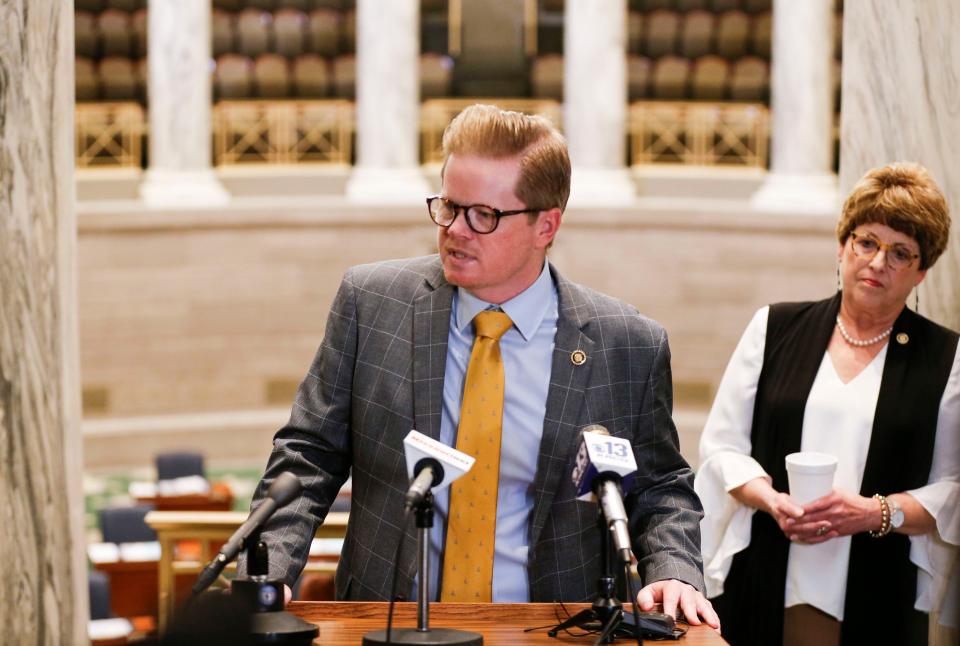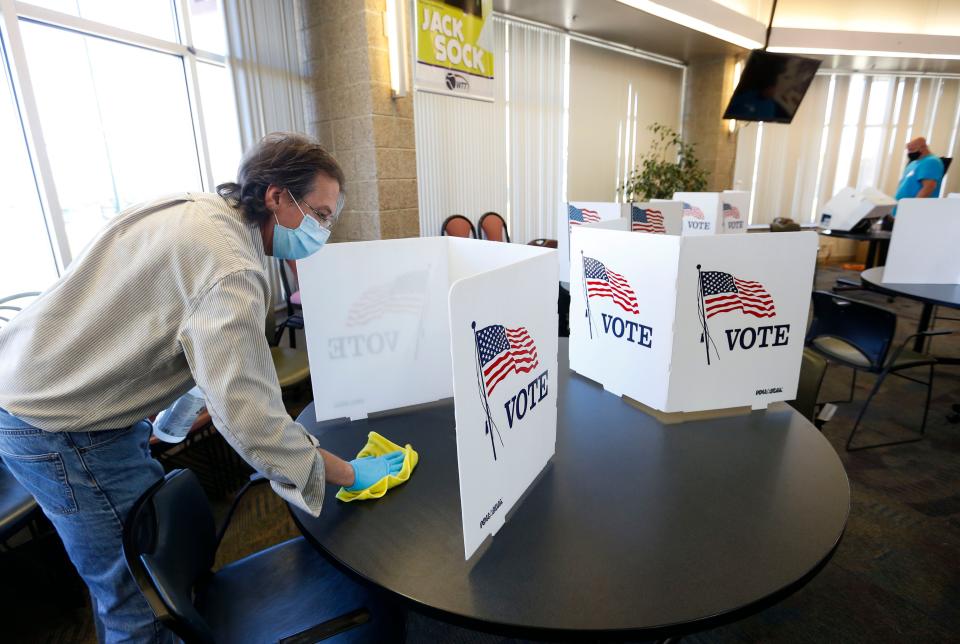Comments in Missouri House hearing about initiative petition bill lead to Senate meltdown
A renewed fight over redundant language meant to influence voters locked up the Missouri Senate this week, sparked by continued discussion of a proposed change to citizen-led initiative petitions.
A Missouri House committee held a public hearing Tuesday for a Senate joint resolution looking to raise the thresholds for approving petitions that change the state constitution. Comments made by the bill’s sponsor, state Sen. Mary Elizabeth Coleman, prompted Senate Democrats to hold up debate on any other bills Wednesday, after she signaled her desire for the House committee to reinsert the “ballot candy” language that had been removed before passing the Senate.

Going a step further, Coleman hinted that a procedural step known as moving the previous question, or PQ, could be used to break future Democratic filibusters in order to move the bill through the chamber if the ballot candy was returned to the measure.
This is a rare move in the Senate, but is used almost daily in the House. Essentially, using the PQ allows for members to vote on legislation even if a lawmaker is not done speaking on the bill. The Senate prides itself on not being like the House in this sense, so using the PQ in the Senate is “really risky” and spends “a ton of political capital,” according to Coleman.
Debates over changing the initiative petition process have taken up a significant amount of time during this legislative session, which is now at its halfway point, as lawmakers take next week off for spring break.
In January, members of the Missouri Freedom Caucus held up gubernatorial appointments until Senate leadership held a committee hearing on legislation changing the threshold to pass initiative petitions.
Their tactics prompted Senate President Pro Tem Caleb Rowden to strip Freedom Caucus members of their Senate committee chairmanships and take the parking privileges that accompany that rank. Members of the Freedom Caucus voiced their displeasure that Rowden wasn’t taking similar punitive actions against Democrats for holding up progress in the Senate.

“Wait a second…I filibustered to pass IP Reform & I lost my chairmanship/committees/parking spot b/c leadership said it wasn’t ok to filibuster based on senate “procedure”. Right now @MOSenate Dems are filibustering on “procedure” (they don’t want a PQ on the IP Reform bill)-Wasting a full day in the senate,” State Sen. Denny Hoskins wrote in a post on X.
When the initiative petition debate finally came to the Senate floor, Democratic Senators engaged in lengthy filibusters to ensure that clean language was presented to voters, stripping the legislation of “ballot candy” that could mislead voters.
Many of the “ballot candy” issues that were in Coleman’s legislation included ensuring that only U.S. citizens and Missouri residents can vote, stopping foreign involvement in initiative petitions, prohibiting raising taxes on some items through initiative petitions and prohibiting lawmakers from receiving gifts. These issues are already guaranteed by state or federal law.
On Tuesday, Coleman explicitly asked the House Elections and Elected Officials committee to add those parts back into the bill.
“There are a number of other provisions that I'm hoping that you'll add back in, in particular making sure that only citizens have the right to vote in our elections,” Coleman said. “The language that came out of the Senate no longer had that.”
State law already specifies that “all citizens” may vote, but many conservative lawmakers don't think this goes far enough or is clear enough to imply that “only citizens” can vote.
“There are protections in place in our state constitution to make sure that citizens can vote, but it isn't abundantly clear that they're the only ones who can vote,” Coleman said.

Many lawmakers have tied proposed changes to the initiative petition process with a petition that aims to reinstate abortion and is currently collecting signatures in hope of making the ballot this year — implying that raising the threshold to pass a petition would effectively stop voters from approving the abortion measure with a simple majority, as Missouri voters did with Medicaid expansion and recreational and medicinal marijuana.
Coleman, who is running for Congress this year, dismissed the idea that her motivation for changing the initiative petition process stems from her stance on abortion. She described herself in the hearing as the “architect of the Missouri Stands for the Unborn Act that ended abortion in the state.”
“I absolutely reject that this is only about abortion,” Coleman said. “I think there's a reason why the left likes that narrative, and it's because everything is about abortion to them. It turns out not everything is about abortion, even to the people who are pushing to protect the unborn and women from that.”
More: Initiative petitions are the topic of much debate in Missouri’s legislature. Here's why
Originally, the legislation, which is a combination of several bills, proposed using a concurrent majority to pass ballot initiatives, meaning that initiative petitions must pass with both a majority of statewide votes and with voters in 82 of 163 state House districts in favor.
While a concurrent majority system is still being proposed, Coleman would now prefer to use the state’s eight congressional districts as the other metric, meaning the petitions would need approval in five of those eight districts plus a majority of the popular vote.
Rep. Eric Woods, a member of the House committee, pointed out that there has been a shift to citizen-led petitions that target constitutional changes rather than enacting statutory changes. The legislature can easily change statute, but any constitutional change must be put before a vote of the people.
One such example of voters enacting a statute that was quickly changed by lawmakers is the 2010 proposition that banned puppy mills. Voters approved the measure as a statutory change, which lawmakers altered in the next legislative session, watering down protections for animals that voters approved.
Woods asked Coleman if she would support adding a measure to the legislation that made it harder for lawmakers to change citizen-led statutory propositions, as an incentive for those to be used rather than constitutional amendments. Coleman said that she does not support that.
“When people put something through the initiative petition process, there are no hearings, there's no chance for people to talk about how the problems are or how the implementation could be difficult,” Coleman said. “In fact, I've never seen a major piece of legislation be enacted that didn't have follow up language the next year to clean that up to make sure that it's implemented as intended.”
Speaking in opposition to the legislation was Marilyn McLeod, the president of the League of Women Voters of Missouri. She feels that it is unfair to raise the threshold for citizen-led petitions when lawmakers can put an initiative petition on the ballot with only a simple majority.
“This proposal violates the principle of majority rule and would probably make it almost impossible for a citizen initiative to pass. This is not one person one vote. This is minority rule,” McLeod said. “Compare this process for citizen initiative to the one in which the General Assembly can put an issue on the ballot with just a simple majority vote.”
This article originally appeared on Springfield News-Leader: Missouri senator wants ballot candy back in initiative petition bill

